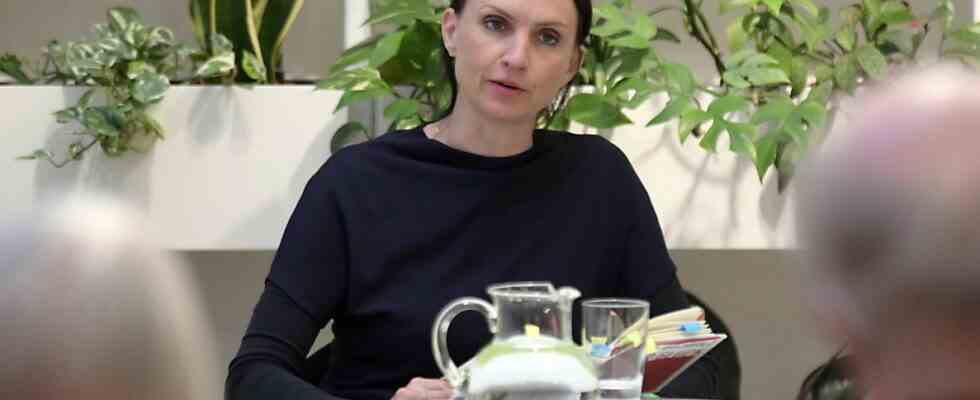It was a long time before her father made up his mind to leave. One day, however, a man was sitting across from him on the train, reading Lena Gorelik from her autobiographical novel “Who we are”, kicking off her dirty boots on her father’s knee and saying: “Go home, you filthy Jew, go to Israel !” And it was also a train that would take her to her new life in Germany. On May 2, 1992, at 11:55 p.m., he drove off. Lena Gorelik, who was eleven at the time, stood at the window and looked at the lights of St. Petersburg for a while. Looked back at her childhood in Russia. Then it got dark.
After two years of pandemic, the Unterhaching Reading Night, although it is taking place for the 18th time, looks like a pop star who is late stepping out of the dark onto the stage. In 2020 the reading night had to be canceled at short notice due to Corona, in 2021 there was a slimmed down version with three authors and the Kubiz as the only event room. On Saturday, however, the reading night was allowed to unfold in six places, a veritable reading hopping, in which the people from Unterhaching quickly found their way back into their role as attentive listeners and discussion participants. In the community library, the SZ authors Roman Deiniger and Uwe Ritzer released memories of athlete Heide Rosendahl or dachshund Waldi with their reading from “The Games of the Century. Olympia 1972, Terror and the New Germany”, but also the image of a new one , democratic Germany that they wanted to show the world, memories of the idea of peaceful coexistence that came to a brutal end in Palestinian terror. A gentleman in the audience praised them for their portrayal of the attacks, saying it was “impressive” how they had prepared “the political and sporting events of an entire century” in their book. On the other hand, a guest in the Helming & Heuser bookshop wanted to know from science journalist and futurologist Ulrich Eberl, who read from “Our Survival Formula. Nine Global Crises and the Solutions of Science”, what “the little man” beyond the World Climate Summit and its funds because you can do for the environment? The biophysicist replied that there was not only a world climate summit, but also a world biodiversity summit in which 190 countries would take part. And one of the goals is to protect around 30 percent of land and sea by 2030. Learned something again.
Science journalist Ulrich Eberl
(Photo: Claus Schunk)
Eberl was followed by Natalie Buchholz, who was “not unknown” in Unterhaching, as Christine Helming, the initiator of the reading night, noted. Buchholz’s novel “Unser Glück” is set in Munich, and that’s important. After all, you want to focus on authors and topics from the region. Buchholz, born in France in 1977, tells the story of a young family who agree to a strange deal for an apartment in an old building in Schwabing that they cannot actually afford: the owner’s ex-husband is allowed to continue living in one room. That sounds like a literary reckoning with the overheated Munich rental market, but after just a few lines it turns out to be a sensitive study of a modern couple who cannot find their way in their new life. Buchholz lets the overwhelmed mother say sentences that a survey on a Munich playground could not produce more impressively. “I consist only of child”. Or: “I lack structure and meaning.”
Catalin Dorian Florescu reads from his historical novel “Der Feuerturm” in Unterhaching
(Photo: Claus Schunk)
“The Tower of Fire” is informative and full of facts, touching and spanning several generations, the historical novel by the writer Catalin Dorian Florescu, who has lived in Switzerland for a long time but has never really left his native Romania, as he says: It is in the nature of Events like the Reading Night present themselves to the visitor as a concentrate of everything that literature can be. Some authors please with precise aesthetics, others with diligent research, still others with simple beauty preserve the thoughts of a girl who is suddenly a stranger. “In the west, they packed happiness into little white bubbles,” Gorelik describes how she took the first bubble bath of her life as a refugee child in southern Germany. Probably the most beautiful sentence of the evening came as a quote to Unterhaching. For their book, Ritzer and Deininger also interviewed Hans-Jochen Vogel, Munich’s mayor in 1972. This sometimes formulated pictorially, one could easily become jealous, Deininger said in the library. And Vogel had said the following about the decision to continue the Olympics after the attacks: “The games went on like the wheels of a float that had fallen over and slowly came to a standstill.”

